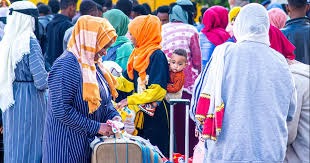IOM Urges More Aid for Rising Number of Yemen’s Stranded Migrants

Amidst the ongoing regional conflicts and socio-economic instability, the International Organization for Migration (IOM) underscores the need for urgent funding to support its Voluntary Humanitarian Return (VHR) programme in Yemen, which plays a pivotal role in facilitating the safe and voluntary return of migrants to their countries of origin.
Ahead of the Sixth Senior Officials Meeting on 7 May in Brussels, the United Nations, international NGOs and Yemeni Civil Society Organisations urgently appeal for sustained support for the 18.2 million people in need in Yemen.
The funding situation for VHR remains exceedingly challenging, with resources being exhausted in the first quarter of 2024 due to the overwhelming demand for assistance. Despite the successful voluntary humanitarian return of close to 6,600 migrants in 2023 and 2,300 earlier this year from Aden and Sana, additional funding is urgently needed to address the escalating needs of stranded migrants in Ma’rib and beyond.
“As migration flows continue to surge, the demand for safe and dignified return options for migrants has reached critical levels,” stressed IOM’s Acting Chief of Mission in Yemen, Matt Huber. “Without immediate funding support, the continuity of this vital programme is at risk, leaving thousands of vulnerable migrants stranded in precarious conditions with many experiencing serious protection violations.”
Yemen has long been a critical transit and destination point for migrants hoping to access improved livelihood opportunities in the Gulf countries. Despite a nearly decade-long conflict coupled with the recent tensions in the Red Sea, the number of migrants arriving annually has tripled from 2021 to 2023, soaring from approximately 27,000 to over 90,000.
It is projected that in 2024, more than 300,000 migrants, predominantly from Somalia and Ethiopia, will require humanitarian assistance and protection services, especially women and girls. With limited access to food, shelter, or work, the plight of migrants remains dire, as they wait for the opportunity to return home.
Positioned close to the frontlines, Ma’rib city has become point of both transit and displacement for migrants. Thousands find themselves stranded, unable to navigate treacherous frontlines or are held captive by smugglers. Women face increased vulnerability, often enduring sexual violence and navigating the difficult task of caring for infants in harsh living conditions.
IOM teams in Yemen and Ethiopia are closely collaborating to facilitate the return and reintegration of more than 1,700 migrants urgently awaiting VHR support.
The desperation among migrants in Ma’rib has led to sporadic gatherings outside the UN Hub in Ma’rib, as the absence of returns since last year has left them with few alternatives. In such circumstances, many rely on smugglers to embark on perilous journeys towards the northern borders. IOM is urging stakeholders to prioritize the protection and rights of all migrants in Yemen. As the only sustainable solution for migrants in Yemen, IOM’s VHR programme requires collaborative efforts among authorities and increased donor support to facilitate more safe and dignified return and reintegration. IOM further calls upon partners and stakeholders to ensure continuity of care after migrants return to their countries of origin through provision of humanitarian and protection interventions as well as reintegration assistance which is critical for enhancing resilience and promoting self-sufficiency.



